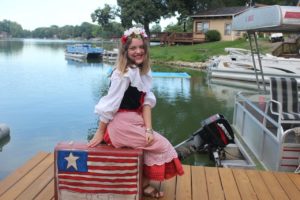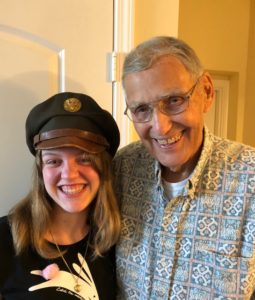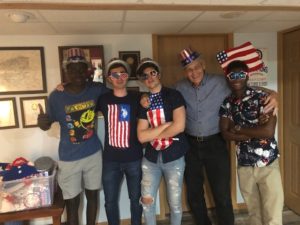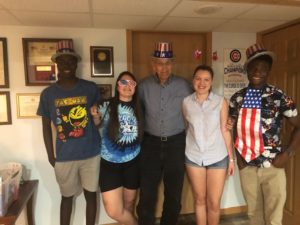Super Sonic Cowboy: U.S. Army Air Corp Veteran Ray Fairbank
Author/Illustrator Maria Walter wrote "Super Sonic Cowboy" for the series A BOOK by ME -- True Stories Written by Kids for Kids
Since Ray liked working with motors back on the ranch, he asked to become an airplane mechanic. But, because his IQ was so high, Ray was sent to weather school at Chanute Air Force Base in Illinois instead.
He learned how to use weather balloons carrying instruments aloft to send back information on atmospheric pressure, temperature, humidity and wind speed. After three months, Ray was sent to Spokane, Washington and was able to stop by and see his family on the way. Later, Ray worked on a very famous top secret program. He was ordered to check wind speed, direction and velocity for a test pilot being asked to break the sound “barrier.” That test pilot was the famous Chuck Yeager.
Learn more about Ray Fairbank in the interactive poster.
Super Sonic Cowboy, is available on Amazon. It is part of A BOOK by ME Hero Series.
Veteran Ray Fairbank loves exchange students. Ray and his wife believed in the importance of exchange which was an idea initiated by General Dwight D. Eisenhower after WWII. Over the years, they hosted thirteen kids from a variety of countries. Later in years he spent time with clusters of kids brought to America by Deb Bowen. He was proud that his young author and illustrator was an exchange student from Poland. Maria Walter loved spending time with Ray and telling his important story, through words and art, for young readers.
- Maria in traditional clothing from Poland
- Maria Walter and Veteran Ray Fairbank
- Babacar from Senegal, Grigor from Armenia, Alex from Spain, Ray and Joe from Liberia
- Babacar from Senegal, Miriam from Ecuador, Ray, Maria from Poland and Joe from Liberia
Ray Fairbank — U.S. Army Air Corp
Ray Fairbank was born on October 7, 1926 on a ranch in Montana. His parents, George and Hermina Fairbank, had six children. One of Ray’s first memories was when he was three or four years old and traveled with his family to Harlem, Montana in a Ford Model T truck to see movies of cowboy actors Tom Mix and Monty Montana. Mr. Mix acted in over one hundred Western movies, most of which were silent films.
Growing up on a ranch was a tremendous experience for Ray, but he witnessed a lot of prejudice between the American Indians and white people. He said, “We called them ‘bucks’ and ‘squaws,’ and they had derogatory names for us too.” Later in life, Ray and his daughter went to a Catholic Charismatic renewal; there he saw love and healing between the two races. It brought tears to his eyes and made him want more of God’s love in his own life.
Ray and his siblings attended a one-room schoolhouse through the eighth grade. There was no electricity at home or at school in those days. The teacher lived in a small house behind the school. The Fairbank children rode a horse to school. At recess, children played a favorite game called Ante-I-Over. Players call out “Annie-Annie Over” and throw the ball over the building to the players on the other side. If they caught the ball they could sneak around the building and throw the ball at or tag a player and they would be out of the game.
When Ray was fourteen, he went to high school in Turner, Montana. When Ray was a Senior, his father hired German prisoners from a Prisoner of War (POW) camp nearby. His father took the truck to the camp to pick up a guard and prisoners to help build fences across his ranch. One of the prisoners was a twenty-year old man named Ottfried Michell. He spoke English and became a friend of the family.
Before the war, Ottfried’s father owned a typewriter factory in Germany. Ray’s mom was German, so when she was told the prisoners didn’t have to be fed anything special, she replied, “They work like us, they will eat like us.” All the POWs wanted to come to Ray’s house to work and eat his mother’s good food!
Graduation time came in 1945, and Ray planned to go into the service. His brother George, who was already serving in the South Pacific, said “no,” so Ray continued to help his father on the ranch. In January 1946, a friend of Ray’s was planning to attend a university, and Ray planned to go with him.
That was when Ray received a letter from Uncle Sam causing him to enlist in the Army Air Corps. He processed his paperwork in Salt Lake City, Utah, and got on a slow train to Harlington, Texas. From there he was transferred to Lackland Air Force Base in San Antonio. Since Ray liked working with motors back on the ranch, he asked to become an airplane mechanic. But, because his IQ was so high, Ray was sent to weather school at Chanute Air Force Base in Illinois instead.
He learned how to use weather balloons carrying instruments aloft to send back information on atmospheric pressure, temperature, humidity and wind speed. After three months, Ray was sent to Spokane, Washington and was able to stop by and see his family on the way. Later, Ray worked on a very famous top secret program. He was ordered to check wind speed, direction and velocity for a test pilot being asked to break the sound “barrier.” That test pilot was the famous Chuck Yeager.
Yeager demonstrated outstanding flying skills and leadership during World War II. On October 14, 1947, breaking the sound barrier, flying the Bell X-1 “Glamorous Glennis” at Mach 1.07 at an altitude of 45,000 feet over the Mojave Desert. This aircraft is now on permanent display at the Smithsonian Institute’s National Air and Space Museum. Ray’s last year of service was an overseas assignment to Bermuda, where he was in charge of the weather equipment. After he was discharged from the military, he married Helen Gunning in 1949. They moved to Montana where he attended Montana State University and received a degree in Engineering. Ray and Helen had a daughter, Mary.
They moved to the Quad Cities when he received a job with Deere and Company. They were married for 28 years when Helen died of heart complications. Ray married Ruthie Lindgren in 1979 and was together until Ruthie’s death 28 years later. Ray and Ruthie had friends named Herman and Anita Mickley who were originally fromGermany. During World War II, Herman was forced to join the German Army at sixteen years of age.
He was injured by pieces of shrapnel in his arm and down his side. After the war, his wife Anita was on the east side of the Berlin Wall; she had to sneak to the west side where she got a job milking cows. They were fortunate to immigrate to America because they received a sponsor in Wisconsin. Like Ray, Herman worked for Deere, and they became best of friends.
Ray is a proud veteran. He lived a life of love, hard work and faith. His ancestors can be traced back to the Revolutionary War. He knows freedom isn’t free but it’s worth fighting for. He hopes we never lose sight of love and compassion.
Note from Ray:
The purpose of this book is to show young people that regardless of how you were raised or negative circumstances one may be faced within life, faith in God and hard work can reap great rewards. I was a child living on a remote ranch in Montana, educated in a one-room school house, and had to move away from my family to attend high school because there were no school buses at that time. Yet these experiences helped me accomplish all the things God has allowed me to do.
In the service, I assisted a former United States Air Force officer and record-setting test pilot, Chuck Yeager. In 1947, he became the first pilot confirmed to have exceeded the speed of sound in level flight. Later in life, my wife and I had 14 foreign exchange students live with us, and I’ve traveled to 15 different countries. My name is on eight different U.S. Patents while working for Deere & Company as an Engineer for 29 years. After retirement, I obtained a masters degree in Biblical Counseling.
At 93 years of age, I presently work with the high school boys at our church. My desire is to help them understand that faith in God will carry them through the tough times in life and will guide them to accomplish great things. The same is true with you.
Never let the negative things in your life hold you back from using your talents to accomplish your full potential. My second grade teacher told me I was the dumbest kid she had ever seen. Her words just caused me to work harder to prove her wrong. This world needs you! You are a unique individual with great potential. Whatever your dreams are, go for it!!!
“War is a grim, cruel business, a business justified only as a means of sustaining the forces of good against those of evil.”
-General Dwight D. Eisenhower
A BOOK by ME, a book series developed by Deb Bowen, empowers students to preserve history by telling the story of unsung heroes in our communities. For the young participants, it’s a guided cross-curricular project that gathers stories of people who do amazing things but have received little or no recognition. Students learn how to publish a picture book that is a primary source document with photographs and a biography.
Since 2003, Deb Bowen has been arranging meetings between students and individuals from the WWII generation. This intergenerational storytelling results in unique storybooks written and illustrated by kids for kids in the A BOOK by ME series. More about Deb Bowen >












